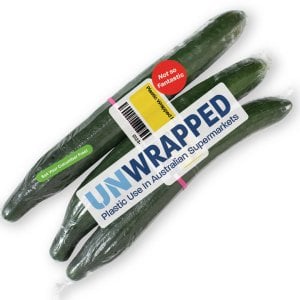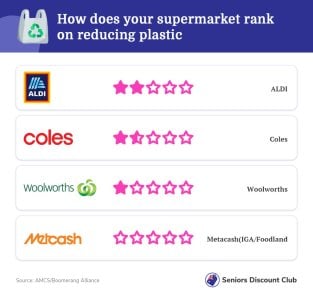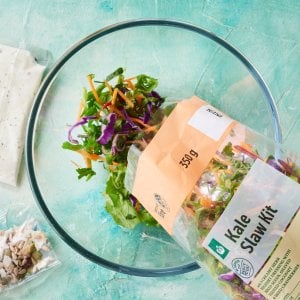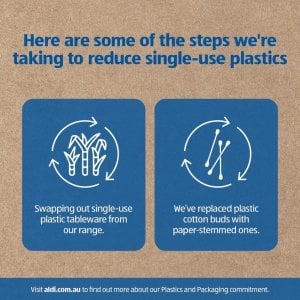IGA, Woolworths, Coles, & ALDI suffer dismal rankings in plastic use report
The impact of plastic production on our planet is undeniable.
Grocery stores play a significant role in this issue, as plastic packaging has become widespread, covering everything from fresh produce to prepared meals.
Are some supermarkets doing their part in addressing this problem? Not quite, according to a recent report.
The Australian Marine Conservation Society (AMCS) and Boomerang Alliance have released a report called UnWrapped: Plastic Use in Supermarkets that assessed the efforts of Woolworths, Coles, ALDI, and IGA in reducing plastic use.
The report explored supermarkets' responsibility for plastic pollution, evoking a strong negative response from one supermarket and a commitment to review and improve from another.
This evaluation occurred in the context of the collapsed RedCycle scheme, which suffered a substantial setback in its mission to address plastic waste.
It was found that the recycling initiative stockpiled soft plastics collected through partner supermarkets in warehouses instead of undergoing proper processing.
The supermarkets were assessed based on five categories in the report:
Despite receiving only two out of five stars, German-owned ALDI surpassed Coles with 1.5 stars and Woolworths with 1.
Notably, Metcash, the parent company of Foodland and IGA, landed at the bottom with a zero-star rating.
The AMCS Campaigner Shane Cucow emphasised the ‘huge influence’ of supermarkets on Australians, considering they are the primary providers of our groceries.
‘Yet, we continue to see ridiculous and wasteful plastics, such as unnecessary packaging of fruit and vegetables, plastic multipacks with several layers of packaging, and tiny plastic toy promotions that inevitably end up polluting the environment,’ the campaigner explained.
While the report centred on supermarket influence, many of the retailers named argued they have limited sway over their suppliers.
ALDI, Coles, and Metcash promptly stressed their dedication to reducing plastic usage and promoting recycling.
Metcash, positioned at the bottom, further pledged to assess the report's suggestions and explore avenues for improvement.
On the other hand, Woolworths deemed the report ‘disappointing’ and asserted that it relied on incomplete data, making it ‘not a reliable reflection of packaging sustainability at Woolworths’ according to a spokesperson.
‘We’ve removed more than 1.4 million kilograms of virgin plastic from our range since 2018, and across all the packaging we can control there is an average recycled content of 49 per cent,’ the spokesperson continued.
‘We know there is still more to do, and we will continue to publish our packaging data to hold ourselves accountable for our progress while encouraging our suppliers to do the same.’
Upon the report's release, Cucow highlighted promotional strategies that incentivise shoppers to use more plastic, selling wrapped fruits and vegetables at a lower cost than loose items.
Environment Minister Tanya Plibersek said, ‘I don’t think we should be wrapping fresh produce like bananas and zucchini in plastic.’
Despite widespread consumer concern, Woolworths defended its use of plastic for fresh produce, citing the need to extend shelf life or provide produce in bulk, according to a statement.
Plibersek is under pressure to address Australia’s soft plastics issue.
After the RedCycle collapse in 2022, she expressed the government's commitment to collaborating with supermarkets for a viable solution.
The manufacturing industry is testing a soft plastics recycling system with yellow bins, but it's uncertain when this trial will become a permanent national program.
In a recent statement, the environment minister mentioned the federal government's collaboration with states to phase out problematic single-use plastics through robust regulations.
She noted the need for businesses to take greater responsibility for the 6.7 million tonnes of packaging they release annually.
Woolworths, having its sustainability report audited by Deloitte, claims a significant increase in recycled plastic use in own-brand packaging and a 26 per cent reduction in virgin material since 2018.
However, the supermarket faces challenges in influencing suppliers to change packaging due to potential breaches of the Australian Food and Grocery Code, unless there is legislative support.
‘While we cannot mandate packaging changes for the other brands that supply us, we have issued problematic material and sustainable packaging guidelines to our suppliers to encourage them to make positive changes,’ the statement read.
Meanwhile, Coles expressed a commitment to reducing unnecessary plastic, supporting industry goals for 100 per cent reusable, recyclable, or compostable packaging by 2025.
Currently, 83.8 per cent of Coles’ Own Brand packaging is recyclable. The company said it has successfully replaced 230 million plastic bags with paper alternatives.
ALDI’s Sustainability Director Daniel Baker acknowledged the business's responsibility, aiming for a 25 per cent reduction in plastic packaging by 2025.
Metcash is also actively working with its independent retailer network to phase out problematic plastic packaging, considering improvements in transparency.
The company said it will focus on identifying and addressing problematic packaging in collaboration with manufacturers and suppliers to minimise waste and plastic usage.

Members, if you've been to Coles, Woolworths, ALDI, or IGA lately, which one do you think is the worst in terms of plastic usage? Rank them from highest (1) to lowest (5) and share your rankings in the comments below!
Grocery stores play a significant role in this issue, as plastic packaging has become widespread, covering everything from fresh produce to prepared meals.
Are some supermarkets doing their part in addressing this problem? Not quite, according to a recent report.
The Australian Marine Conservation Society (AMCS) and Boomerang Alliance have released a report called UnWrapped: Plastic Use in Supermarkets that assessed the efforts of Woolworths, Coles, ALDI, and IGA in reducing plastic use.
The report explored supermarkets' responsibility for plastic pollution, evoking a strong negative response from one supermarket and a commitment to review and improve from another.
This evaluation occurred in the context of the collapsed RedCycle scheme, which suffered a substantial setback in its mission to address plastic waste.
It was found that the recycling initiative stockpiled soft plastics collected through partner supermarkets in warehouses instead of undergoing proper processing.
The supermarkets were assessed based on five categories in the report:
- Plastic footprint reduction
- Reuse and refill
- Recycling and recycled content
- Policy, planning, and governance
- Transparency
Despite receiving only two out of five stars, German-owned ALDI surpassed Coles with 1.5 stars and Woolworths with 1.
Notably, Metcash, the parent company of Foodland and IGA, landed at the bottom with a zero-star rating.
The AMCS Campaigner Shane Cucow emphasised the ‘huge influence’ of supermarkets on Australians, considering they are the primary providers of our groceries.
‘Yet, we continue to see ridiculous and wasteful plastics, such as unnecessary packaging of fruit and vegetables, plastic multipacks with several layers of packaging, and tiny plastic toy promotions that inevitably end up polluting the environment,’ the campaigner explained.
While the report centred on supermarket influence, many of the retailers named argued they have limited sway over their suppliers.
ALDI, Coles, and Metcash promptly stressed their dedication to reducing plastic usage and promoting recycling.
Metcash, positioned at the bottom, further pledged to assess the report's suggestions and explore avenues for improvement.
On the other hand, Woolworths deemed the report ‘disappointing’ and asserted that it relied on incomplete data, making it ‘not a reliable reflection of packaging sustainability at Woolworths’ according to a spokesperson.
‘We’ve removed more than 1.4 million kilograms of virgin plastic from our range since 2018, and across all the packaging we can control there is an average recycled content of 49 per cent,’ the spokesperson continued.
‘We know there is still more to do, and we will continue to publish our packaging data to hold ourselves accountable for our progress while encouraging our suppliers to do the same.’
Upon the report's release, Cucow highlighted promotional strategies that incentivise shoppers to use more plastic, selling wrapped fruits and vegetables at a lower cost than loose items.
Environment Minister Tanya Plibersek said, ‘I don’t think we should be wrapping fresh produce like bananas and zucchini in plastic.’
Despite widespread consumer concern, Woolworths defended its use of plastic for fresh produce, citing the need to extend shelf life or provide produce in bulk, according to a statement.
Plibersek is under pressure to address Australia’s soft plastics issue.
After the RedCycle collapse in 2022, she expressed the government's commitment to collaborating with supermarkets for a viable solution.
The manufacturing industry is testing a soft plastics recycling system with yellow bins, but it's uncertain when this trial will become a permanent national program.
In a recent statement, the environment minister mentioned the federal government's collaboration with states to phase out problematic single-use plastics through robust regulations.
She noted the need for businesses to take greater responsibility for the 6.7 million tonnes of packaging they release annually.
Woolworths, having its sustainability report audited by Deloitte, claims a significant increase in recycled plastic use in own-brand packaging and a 26 per cent reduction in virgin material since 2018.
However, the supermarket faces challenges in influencing suppliers to change packaging due to potential breaches of the Australian Food and Grocery Code, unless there is legislative support.
‘While we cannot mandate packaging changes for the other brands that supply us, we have issued problematic material and sustainable packaging guidelines to our suppliers to encourage them to make positive changes,’ the statement read.
Meanwhile, Coles expressed a commitment to reducing unnecessary plastic, supporting industry goals for 100 per cent reusable, recyclable, or compostable packaging by 2025.
Currently, 83.8 per cent of Coles’ Own Brand packaging is recyclable. The company said it has successfully replaced 230 million plastic bags with paper alternatives.
ALDI’s Sustainability Director Daniel Baker acknowledged the business's responsibility, aiming for a 25 per cent reduction in plastic packaging by 2025.
Metcash is also actively working with its independent retailer network to phase out problematic plastic packaging, considering improvements in transparency.
The company said it will focus on identifying and addressing problematic packaging in collaboration with manufacturers and suppliers to minimise waste and plastic usage.
Key Takeaways
- A new report has ranked the efforts of Woolworths, Coles, ALDI and IGA to reduce plastic use, with ALDI coming out on top with two out of five stars.
- The report, undertaken by the Australian Marine Conservation Society (AMCS) and Boomerang Alliance, found that there is still an excess of unnecessary and wasteful plastics being used across supermarkets.
- In response to the report, the supermarkets highlighted their commitment to reducing plastic use and improving recyclability, and Metcash stated it will consider the report’s recommendations and look at making improvements.
- Tanya Plibersek, Environment Minister, reiterated the need for further action on the excessive use of plastics, particularly in single-use packaging for fresh produce.











